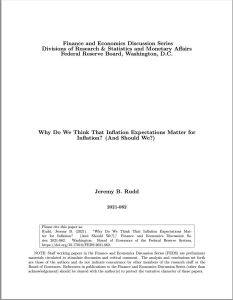Join getAbstract to access the summary!

Join getAbstract to access the summary!
Jeremy B. Rudd
Why Do We Think That Inflation Expectations Matter for Inflation? (And Should We?)
New York Fed, 2021
What's inside?
The theory that inflation arises from people’s expectations about it may be wrong.
Recommendation
Supply-chain bottlenecks, energy shortages and surging demand in a post-COVID-19 world have ignited inflation fears. But the assumption “that expected inflation is a key determinant of actual inflation” is getting pushback from Federal Reserve economist Jeremy B. Rudd. In this contrarian analysis, he examines the basis of the inflation-expectation hypothesis and its efficacy in predicting price dynamics. Economists, policy experts and executives will find a timely and insightful look at inflation mechanics in this cutting-edge report.
Summary
About the Author
Jeremy B. Rudd is a senior advisor for the Board of Governors of the Federal Reserve.


















Comment on this summary